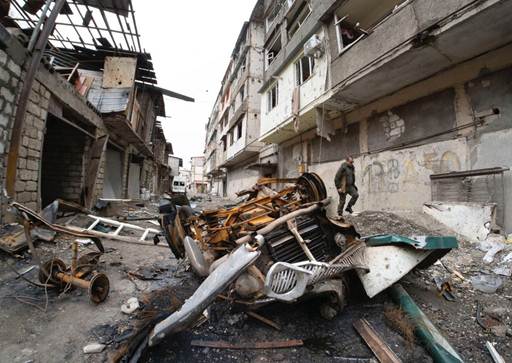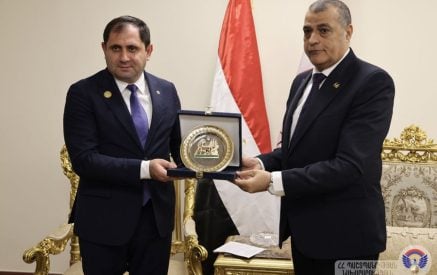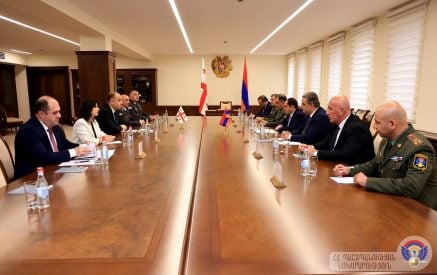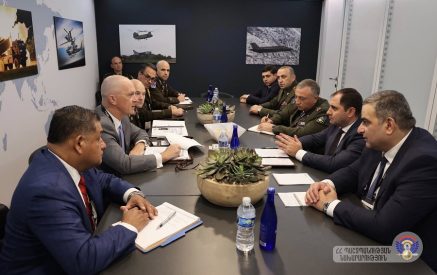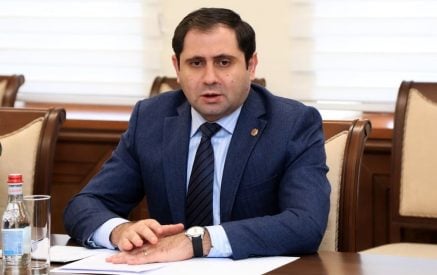This article was originally published in The Boston Globe. Click here to read it.
The United States, Russia, and France must work together to advance a diplomatic solution.
By David L. Phillips
Armenia is under renewed threat as fighting continues in Nagorno-Karabakh, an ethnic Armenian enclave in Azerbaijan. President Recep Tayyip Erdogan of Turkey and President Ilham Aliyev of Azerbaijan have scorned calls to end the violence, and have intensified attacks against civilians. Most victims are ethnic Armenians, but scores have been killed on both sides. At a time when US leadership is critical, President Trump’s business interests in Turkey and Azerbaijan complicate diplomatic efforts.
Read also
Azerbaijan launched military operations against Nagorno-Karabakh on Sept. 27. Backed by Turkish air power, drones, and jihaidist fighters from Syria, Azerbaijan attacked Stepanakert, the capital of Nagorno-Karabakh. The targeting of civilian areas has been confirmed by BBC and other journalists on-the-ground. The conflict risks spiraling out of control, resulting in a regional conflagration involving Russia, an ally of Armenia, and Turkey, which supports Azerbaijan, as well as Iran, which is attempting to broker a peace deal while warning both countries not to cross the border into the Islamic republic.
The South Caucasus are prone to conflict. Armenia and Azerbaijan fought a bloody war over Nagorno-Karabakh from 1988 to 1994. As the Soviet Union was collapsing, the Nagorno-Karabakh parliament voted to unite with Armenia. In response, Azerbaijan launched a series of pogroms in Sumgait and Baku targeting Orthodox Christian Armenians. Up to 30,000 people were killed and almost 1 million displaced during the fighting.
The United States supported the Nagorno-Karabakh independence movement during the Soviet era. It participated in the Minsk Group — a diplomatic troika made up of the United States, Russia, and France. The Minsk Group was authorized by the Organization for Security and Cooperation in Europe and the United Nations to mediate a solution, but Azerbaijan has never adhered to agreed ceasefires, thereby undermining momentum toward a sustainable diplomatic solution.
The approach of Armenians is profoundly influenced by the Armenian Genocide. Between 1915 and 1923, up to 1.5 million Armenians were killed in the waning years of the Ottoman Empire. Nagorno-Karabakh is the most recent flash point of Turkic aggression.
Last week, Erdogan promised Turkey’s unwavering support to Azerbaijan. “Turkish-Azerbaijani cooperation is based not only on strong solidarity between our states, but also on common history and unity of our hearts,” he proclaimed. “Turkish and Azerbaijani people speak the same language, have a common history. Our relations are built on this sound foundation and strengthening on the basis of the ‘one nation, two states’ principle.”
The United States, the European Union, the UN, NATO, Pope Francis, and others have all called for a ceasefire, which Erdogan and Aliyev have ignored.
Instead, Turkey is deploying its jihadist mercenaries to Nagorno-Karabakh. Meanwhile, the Sultan Murad and Al-Amshat brigades have been deployed from Syria. They are joined by elements of the Hamza Division, notorious for abusing women, executing Christians, and desecrating churches.
Erdogan is flexing Turkey’s military muscle, sending forces to Iraq, Syria, Libya, Cyprus, Somalia — and Azerbaijan. Conflict is a distraction from growing domestic opposition resulting from Erdogan’s mismanagement of Turkey’s economy. When he came to power in 2002, one US dollar was worth two Turkish lira. Today the lira is trading at 7.6 to the dollar.
Azerbaijan is also suffering economic distress, resulting from reduced oil and gas revenues. Yet Aliyev still spends $2.267 billion on Azerbaijan’s armed forces, an amount five times greater than Armenia.
The situation in Nagorno-Karabakh is further complicated by geopolitical competition between Russia and Turkey. Ever since a Turkish F16 shot down a Russian warplane, in 2015, Turkey and Russia have been vying for geopolitical influence. Russia has played a double game, providing weapons to both Azerbaijan and Armenia.
With US-made F-16s currently engaged in operations against Armenia, the Armenian prime minister asked the US to stop Turkey from using American weaponry against Armenians. Canada halted arms exports to Turkey on Oct. 5.
When the Minsk Group recently called for a ceasefire, Erdogan dismissed its appeal and blamed the international community for the problem. Diplomacy should be upgraded by the UN Security Council.
The United States, Russia, and France — permanent members of the Security Council — must work together to advance a diplomatic solution. A resolution should identify Azerbaijan and Turkey as aggressors and establish an international monitoring mission on Nagorno-Karabakh’s borders under Chapter 7 of the UN Charter. Chapter 7 authorizes all necessary means to preserve peace and security.
The Trump administration must do its part by ceasing all military assistance to Azerbaijan, and enforcing Section 907 of the Freedom Support Act, which prohibits US assistance to the government of Azerbaijan until it takes “demonstrable steps to cease all blockades and other offensive force against Armenia and Nagorno-Karabakh.”
In addition, the United States should apply sanctions against Turkey under the Countering American Sanctions Against Adversaries Act, adopted by Congress in response to Turkey’s purchase of S400 missiles from Russia. The Trump administration is reluctant to back its rhetoric with meaningful action. Trump has opaque business ties in both Turkey and Azerbaijan. He received millions of dollars from licensing agreements in Turkey as well as fees from Azerbaijani oligarchs. He may need financing from Turkish and Azerbaijani concerns to service the Trump Organization’s $400 million debt.
Given his financing requirements, Trump may be unwilling to put the US national interest ahead of his personal financial interest.
David L. Phillips is director of the Program on Peace-building and Human Rights at Columbia University. He chaired the Turkish-Armenian Reconciliation Commission and the Track Two Program in Turkey and the Caucasus and has written two books on the region, “Unsilencing the Past” and “Diplomatic History: The Turkey-Armenia Protocols.” Phillips’ newest book is Frontline Syria: From Democratic Revolution to Proxy War (click here for more information)



















































